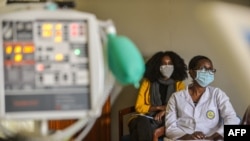COVID-19 travel restrictions in Ethiopia are forcing pregnant women to give birth at home, health workers say.
For Kenasa Kumera, receiving panicked phone calls from women going into labor has become an everyday occurrence.
Ever since Ethiopia implemented strict travel bans last month to stop the spread of the coronavirus, the Marie Stopes International maternity center he manages in Adama, roughly 100 kilometers from the capital, Addis Ababa, has received up to 10 calls a day from women unable to reach his center to give birth.
The trend, he said, is of particular concern in poor areas with no ambulances and where traveling even small distances can be difficult.
"This morning, one client has called in need of an ambulance. She had two Caesarean sections before and she was appointed for another Caesarean section," Kenesa told VOA via a messaging app. "She has been suffering due to the shortage of transportation and she asked for an ambulance. I immediately sent her one. Now she is admitted and the third Caesarean section is safely conducted."
Kenasa said he was concerned that many other women have not been able to arrange transportation, so are forced to give birth at home where medical emergencies cannot be treated.
"Definitely there could be complications since there is no means of transportation and proper health service provisions in the towns," he said. "No doubt complications will happen."
Parliament on Friday approved a nationwide state of emergency, giving authorities sweeping powers to prevent the movement of people. Schools, bars, cultural restaurants, hairdressers and gyms were already closed.
On March 23, the government issued orders to public transporters to cease overcrowding. The regions of Oromia, Amhara, Harari and Tigray have banned or restricted public transport to help limit the spread of the coronavirus.
Ethiopia has recorded 65 cases.
The Ethiopian Ministry of Health did not respond to questions on access to health services for pregnant women.
Risha Hess, country director for Marie Stopes in Ethiopia, told VOA via a messaging app that people all over the country were no longer able to reach health services for delivery or post-natal care.
"We're able to pick people up and bring them to the hospitals and so far that's what we've done," Hess said. "If it continues who knows — we only have one ambulance at every hospital. There will likely be people who we can't get to fast enough or because we don't have the capacity. I can only imagine what's happening with all the other maternity centers in the country."
There are shortages of sexual and reproductive health products from India because factories there have closed and the borders are shut. This, she said, could result in "years of problems and backlogs" due to the borders shutting down across the world.








